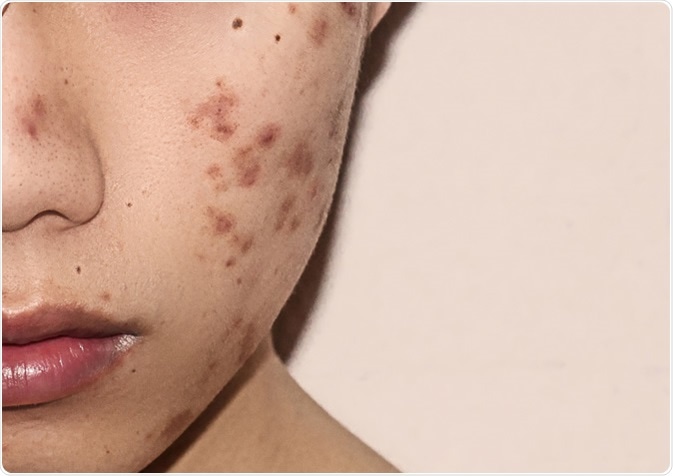Acne is a disorder of the pilosebaceous units of the skin which causes breakouts, or spots, to appear on the body. The most common sites of acne are the face, the neck, the upper chest and back, and the shoulders.

Close-up of acne on the skin. Image Credit: KirinIsHappy / Shutterstock
Teenage and young adult women are most commonly affected, but males also have a significant prevalence of the condition.
Acne can be mild, moderate, or severe. However, all types of acne can have a severe effect on the body image and self-esteem of the individual affected.
It is most prevalent at the ages when social behavior and the need for social acceptance is highest, coupled with the most exacting, often artificial, standards of physical appearance expected by oneself and by others. Peer pressure to conform to these standards is enormous in many cultures.
The perceived failure to meet these expectations by a person with acne may lead to a loss of social status among one’s peers. This underlies the huge impact of even mild acne on the psychological well-being of the patient.
Acne and Poor Body Image
Individuals who suffer from acne often feel ashamed of the lesions, and compensate in various ways. They may hide themselves by refusing to go out with others. Others may grow their hair long or hang it over their face to hide the lesions. Young males who have acne over the shoulders, chest, or back, sometimes refuse to partake in sports like swimming because they have to change in public dressing rooms. Girls may opt for heavy makeup to hide current lesions or acne scars, without bothering about the possible flares the cosmetics might cause.
Acne and Social or Self-Rejection
Acne often makes a person feel extremely unattractive, so that one may lack the self-confidence even to look others in the eye. Such individuals may feel too shy to make friends with the opposite sex. They may face mocking comments from their peers who lack the appreciation of character or the courtesy to behave respectfully to others.
Many acne patients report that they are acutely sensitive about how others perceive them on first meetings. Almost half of the patients in one study felt that others considered them to be dirty because of their acne.
Such experiences may breed a vicious cycle of fear to face others. In the most extreme of such cases, the individual may develop a social phobia, and become house-bound.
Acne and Poor Academic Performance
Children with acne may not want to attend school during breakouts for fear of taunting or because of a low self-confidence. Even adults with acne may refuse to attend work or may be fearful of taking up certain jobs which demand a ‘perfect appearance’ in their eyes.
Job interviews appear to be more challenging for acne patients, both because they lack self-confidence, and because they are judged as less worthy by the interviewers on the basis of their appearance.
Unfortunately, many people who still have acne as working adults are the subject of well-meant criticism of their lifestyles and habits, and may be forced to seek treatment for what would otherwise be perceived by them as a minor disorder.
Acne and Depression
In both young and adult acne patients, depression may set in. This should be recognized and treated appropriately, as medical treatment for acne may take time to successfully get rid of the lesions and scars. The symptoms range from withdrawal or poor academic performance, to various bodily aches and pains which have no identifiable physical cause, loss of appetite, loss of interest in activities once favored, sleep disturbances, and mood lowering.
Tools to Measure the Effect of Acne on Self-Esteem
Various psychological scales and rating instruments have been developed to measure the impact of acne on one’s mental and emotional well-being, and on the quality of life. They include:
- APSEA: Assessment of the Psychological and Social Effects of Acne
- Acne-QoL: Acne Quality of Life and Acne-Q4
- AQOL: Acne Quality of Life Scale
- ADI: Acne Disability Index
- CADI: Cardiff Acne Disability Index
"SKIN" - Student Short Film About Acne (2018)
References
Further Reading
Last Updated: Dec 30, 2022